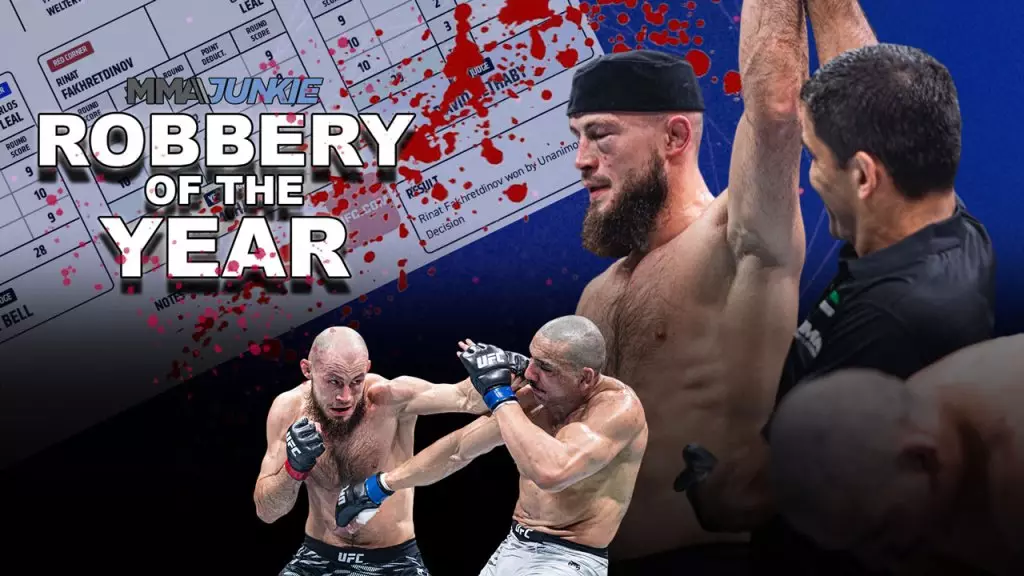The world of mixed martial arts is no stranger to controversial decisions. Yet, the unanimous decision victory for Rinat Fakhretdinov over Carlos Leal at UFC 308 has sparked a particularly heated debate among fans, fighters, and analysts alike. The nuances in how the fight played out highlight the complex nature of scoring in MMA and raise questions about the disparity between judges’ interpretations and public opinion.
Rinat Fakhretdinov, entering the Octagon with a professional record of 23-1-1, was poised to continue his undefeated UFC streak. Facing him was Carlos Leal, a newcomer with a solid background of 21 wins and only 6 losses. From the outset, it was clear that the fight had a rhythm of its own. Both athletes engaged in a battle of wills, with Fakhretdinov displaying aggression and Leal countering with tactical finesse.
Round one commenced with Fakhretdinov focusing on leg kicks and securing an early takedown. However, Leal’s resilience was evident as he quickly returned to his feet, ready to exchange punches and kicks. The round occupied a back-and-forth dynamic, with significant exchanges on the feet. Despite Leal’s superior striking and effective leg kicks, two of the three judges gave the round to Fakhretdinov. This decision has been met with widespread critique, as statistical evidence indicated that Leal outstruck Fakhretdinov, illustrating the fundamental inconsistency in judging criteria.
As the rounds progressed, Fakhretdinov’s attempts at grappling became increasingly transparent. The second round saw him struggling against Leal’s defense, who adeptly stuffed takedown attempts and maintained an aggressive posture. Leal’s notable leg kicks showcased his dominance, causing visible fatigue in Fakhretdinov, yet perplexingly, the judges rewarded the latter with the decision. This trend questions the efficacy of judging standards employed in the UFC and emphasizes a need for reform.
In the concluding round, Fakhretdinov continued to seek takedowns, yet he found more success in exchanges. Leal, however, maintained offensive pressure, demonstrating superior striking accuracy and volume. The final exchanges were spirited, leaving the audience and analysts puzzled at the choice to favor Fakhretdinov despite his 2-19 record in takedown attempts and overall struggles. The discrepancy highlights a critical flaw: while a fighter’s intent is crucial, the judges’ scoring should robustly account for effective striking and damage inflicted.
The fallout from this decision illustrates a larger systemic issue within the sport. Fighters and analysts have vocally expressed dissatisfaction with judges’ inconsistency, leading to calls for a more comprehensive understanding of the rules governing scoring. The reactions from commentators during the fight were palpable, reflecting widespread disbelief in Fakhretdinov’s victory.
For Carlos Leal, the outcome serves as an unfortunate blemish on his promising career. Despite his valiant effort on short notice, the loss may linger as a reminder of how unpredictable the sport can be and how subjective the judging criteria can appear. On the other hand, Fakhretdinov walks away with a record that belies the performance delivered in the Octagon, raising concerns about future matchups — how will fighters strategize when faced with potential scoring pitfalls?
The clash between Fakhretdinov and Leal at UFC 308 will likely leave a lasting impression on the sport’s discourse regarding scoring and judging. As fans and fighters alike reflect on this bout, the overarching narrative points to a pressing need for clarity and consistency in how fights are assessed. While pioneering bouts ignite passion among audiences, they must be matched with a robust framework of rules that ensure fairness and encourage the best athletes to showcase their talent unencumbered by controversial judgments. As this debate continues, the implications of this fight will likely resonate throughout the MMA community, sparking discussions about reform and accountability in the sport’s judging landscape.

